Shopify has proven to be one of the most successful e-commerce platforms in the world. Moreover, a specific app market has been created around Shopify over recent years. Marketing tools of all colors and stripes occupy the lion’s share of the integrable third-party applications for Shopify users.
Despite its venerable age, email keeps remaining at the top of modern marketing activities in terms of efficiency. It is almost a platitude to show how far behind the email is leaving all other channels in the ROI competition.
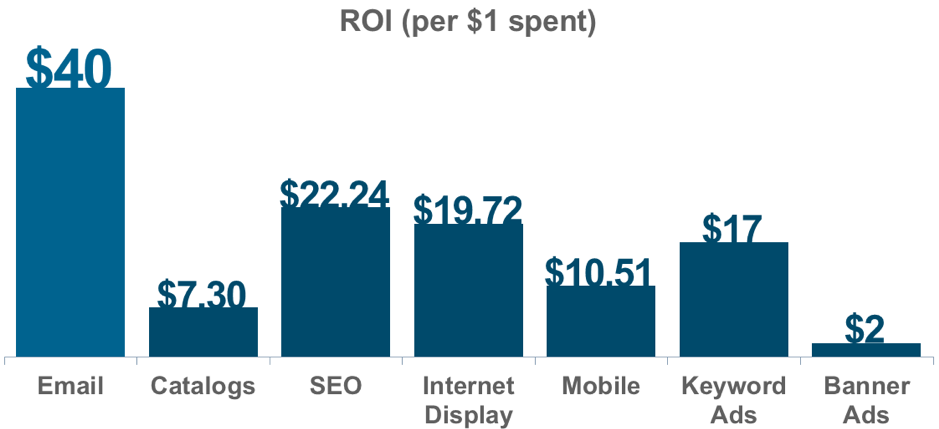
Nothing weird is in it, however. Contemporary emailing technology offers much more opportunities than just peer-to-peer text messaging. Fully automated marketing campaigns capable of covering huge audiences with a variety of creative approaches reflect what e-commerce entrepreneurs appreciate email apps for.
Is there competition between email marketing services for Shopify? Indeed, there is, since demand creates supply. Shopify keeps gaining popularity among e-store owners, and various Shopify-related satellite apps, therefore, keep appearing day after day. It so happens that no one-fits-all email marketing platform is able to monopolize the email marketing segment in the Shopify environment. And this is great because we’ve got a lot to choose from.
Below you can find a list of the top 10 Shopify apps for email marketing that we consider are worth your attention. They differ in functionality and pricing. It’s up to you to figure out which app fits your Shopify project best.
1. Firepush

This is the mark of the current digital era when consumer attention is overstretched across a variety of internet-based communication channels. Turning traffic into sales is a tough task, therefore. That’s why Firepush offers omnichannel campaigns and automations via emails, SMS, and web push notifications. If you need a Shopify-specific omnichannel tool for your customers’ engagement Firepush is here to satisfy your needs almost completely.
The well-targeted email campaigns can hardly be executed in bulk without segregation of customers by their behaviors. The one-click segmentation from Firepush meets the challenge with ease. The following types of automated email campaigns are aimed at both maximizing sales and building brand loyalty:
- Promotional emails
- Abandoned cart emails
- Welcome new customer emails
- Win back customer emails
- Order confirmation emails
- Order dispatched emails
- Payment refund emails
Firepush offers three paid plans. The cheapest one costs only $15/month for an unlimited number of contacts with 6K emails and 7K web pushes. Promotional campaigns, customer support, and subscriber migration are included. The next tier doubles everything plus advanced reports and segmentation are added. The most expensive tier is characterized by one word only: unlimited.
Merchants from 130 countries prove that Firepush is the innovative marketing platform worth your attention.
2. GetResponse
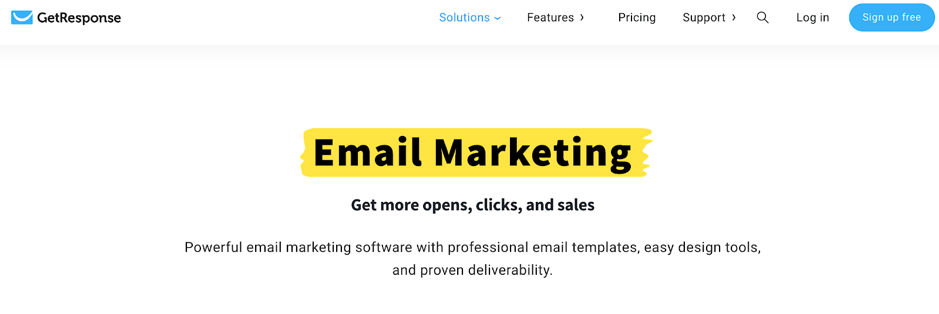
The 23-year-old experience in the email segment has provided the GetResponse team with a clear vision of what users expect from email marketing. The platform created in 1998 has been competing successfully up to now. GetResponse looks and acts like a full-spectrum CRM system.
Such a mature solution as GetResponse does make no hype in providing users with everything necessary to create effective email campaigns. Nothing redundant is available in the system which enables you to do your business confidently. CTR tracking, email automation, landing pages, and customer segmentation constitute a set of the must-have features every self-respecting email marketing platform should offer.
There is a specific highlight in GetResponse, however. A webinar feature allowing to cover up to 100 customers can facilitate the promotion of a new product or a service. The feature is not free, by the way, being inherent in the second tier by price. You can expand your audience by jumping onto a more expensive tier, if necessary.
The tariff plans of GetResponse sound reasonable in general being started from $15/month for 1K subscribers.
Usability is considered the biggest advantage of GetResponse since the platform is extremely user-friendly. Almost nothing can go wrong with the clear and simple layouts they offer. Besides, the platform can be thoroughly integrated with your Shopify e-store to feel like a Shopify-native app.
The only drawback some users recognize in GetResponse is relatively poor analytics. It is not so detailed as many experienced e-merchants want it to be.
3. Moosend
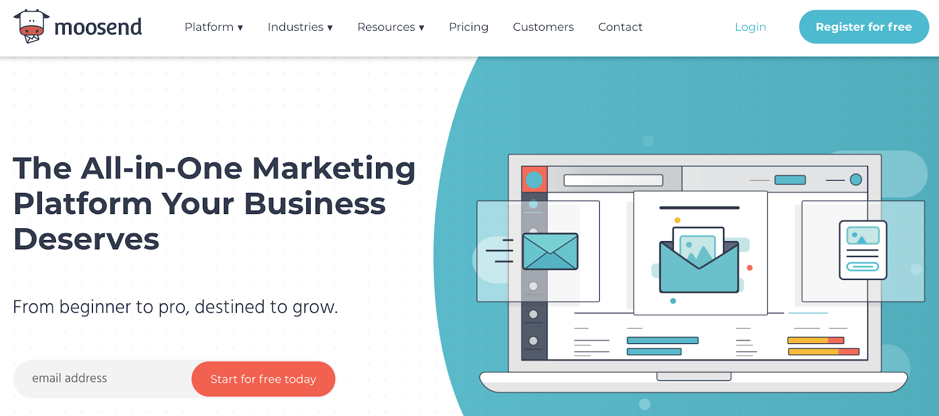
The role of email marketing in your overall marketing strategy is hard to overestimate. The research asserts that the email marketing ROI has jumped from $40 to $54, which confirms the tool’s importance for boosting your business. Moosend is intended to help you master the art of developing efficient email outreach campaigns. By helping you with the creation of a winning strategy, the app will enable you to enhance customer retention and profitability.
Moosend is appropriate for both small and large businesses. The service neatly arranges your email marketing by automating your emails and interacting with potential clients in a more targeted and personalized manner. With engaging and powerful emails, you can bring your interaction with the customers to a whole new level.
Enhance your email marketing even further on both strategic and tactical levels, while minimizing your marketing efforts. Moosend offers plenty of resource-saving features for these purposes. We all know that a bundle of emails in every inbox gets deleted without reading. Moosend increases the open rates of your emails by creating exclusively relevant messages which are likely to be opened by your subscribers.
A free plan is available for less than 1,000 subscribers.
4. ConvertKit
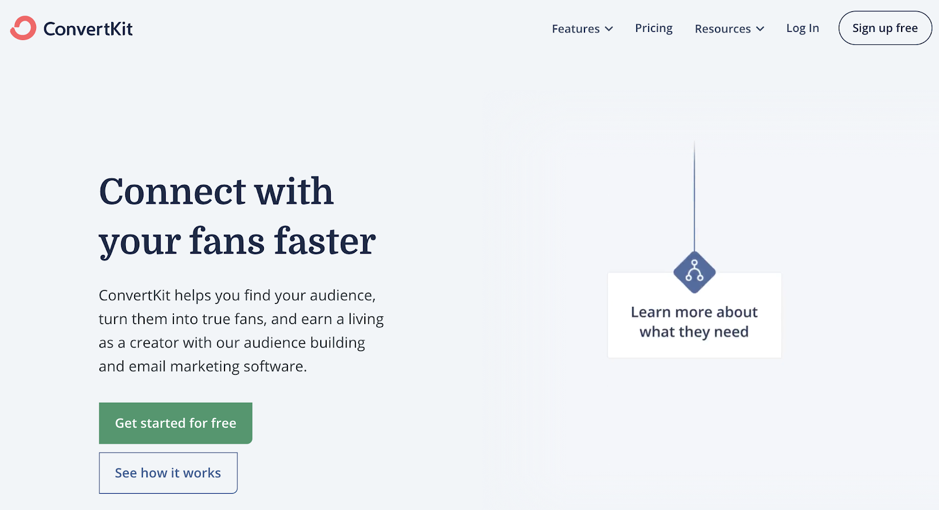
Content creators who look for building their audience to earn for living with the help of email marketing, inter alia, would appreciate ConvertKit most likely. This interesting service appeared in 2015 to follow the newest trends in the contemporary digital lifestyle.
The relative infancy of the platform determines what ConvertKit offers to its target audience. The latter is supposed to consist of professional bloggers - quite a fresh phenomenon in the mass consumer market. At the same time, the ConvertKit team does not limit the service users by bloggers only.
Advertising revenue seems to be the most well-known way of earning money for those who create content. Selling some goods along the line can be a good satellite business for them, nonetheless. That’s why ConvertKit combines audience-building tools and email marketing software. This is a decent choice for both individual entrepreneurs and small businesses.
Simple integration with Shopify allows you to sync your e-store customers’ data with ConvertKit to create automations based on the purchase history. Landing pages, sign-up forms, and various visuals are in the scope of ConvertKit as well.
The platform offers a standard kit of email marketing features similar to what any other email automation service has. But there is an interesting bonus if you sign up for the email marketing platform: while joining the community you will get access to free courses on how to launch your first business online.
The typical subscriber-based pricing can surprise with nothing except, maybe, the scope of features equal for each tier. The difference is in the number of subscribers. By the way, ConvertKit offers a special concierge service to migrate to the platform if you have more than 7.5K subscribers.
No free plan is available on the service, but a 14-day free trial can help you to realize whether ConvertKit is your choice or not.
5. SendX

If it were necessary to create a slogan for this service, “nothing but emails” would seem to match up best. Sending email campaigns, building email lists, automating email sequences - SendX is all about email marketing.
Being focused on email automation the platform, however, can automate some other items such as forms, pop-ups, and landing pages. Narrow specialization of the platform along with an intuitive interface helps users avoid various complications inherent in many omnichannel rivals of SendX.
Seamless integration with Shopify allows creating highly customized email campaigns. The advanced functionality of the platform includes A/B testing, segmentation & tracking, chatbot integration, and the like. Both SendX drag-n-drop email editor and pre-built templates enable users to create emails with professionally-looking design elements (timers, buttons, etc).
Almost all service features are included in every paid plan (no free plan is available). The cheapest tier costs only $7.49/month with up to 1K subscribers for an unlimited number of emails.
Exclusive features such as advanced email marketing training and executive ROI review are available for the enterprise plan only.
6. Constant Contact
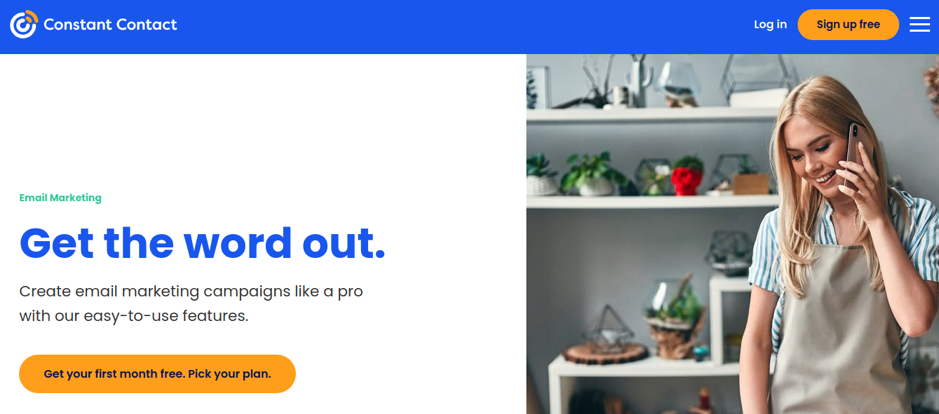
This platform has been evolving in the email marketing segment for a couple of decades. Constant Contact can be an example of how quite an ordinary email service with modest functionality turns into a great event-based marketing platform with numerous modern options.
It’s clear that the platform's team prioritizes email. Otherwise, Constant Contact would unlikely be recognized as a service with the best email deliverability ever.
A large library with premade templates along with a user-friendly drag-&-drop email editor is just the basis for the creation of advanced email campaigns. Everyone can easily sync a Shopify e-store with Constant Contact to engage customers with various targeted messages. Popup forms, landing pages, social media integration, and online payment tools constitute a binding set of features for every progressive ecommerce entrepreneur. Customized transactional email campaigns can be created for dormant contacts as well as for the ones with abandoned carts. The platform-specific functionality includes some special offers such as coupons and polls.
Constant Contact offers only two paid plans for $20/month and $45/month respectively. The more expensive plan includes everything available in a cheaper one plus such premium features as A/B testing, dynamic content, coupons & polls, and newcomers consultations.
Some users consider the pricing not fair enough since many premium options are available in other services for much lower prices if not for free.
7. MailerLite
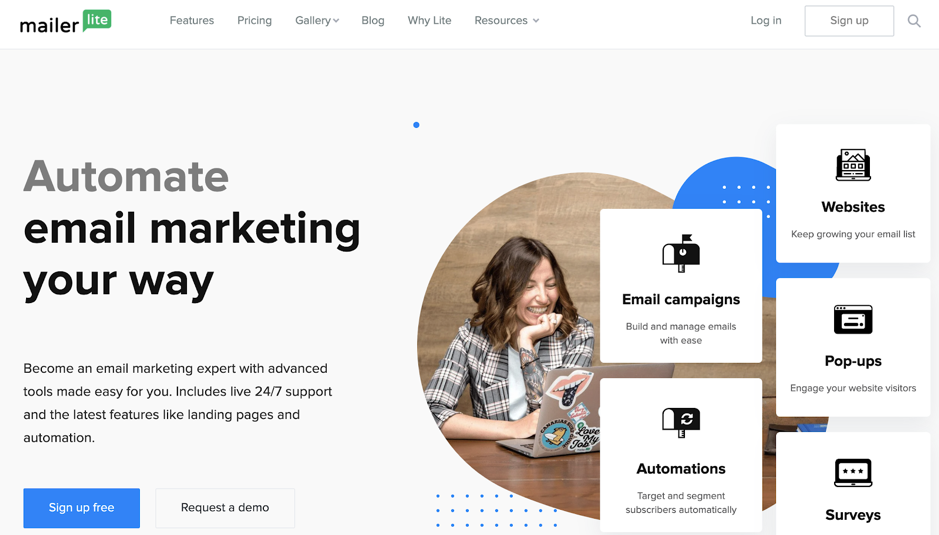
This web-based email marketing service stands out for its cost-efficiency. Bloggers, freelancers, and small businesses are MailerLite’s target audience which would appreciate free plans with rich functionalities.
MailerLite has one of the lowest learning thresholds in the segment. The extremely easy-to-use email automation builder available on the platform enables newcomers to start their campaigns almost immediately. Besides, simple API-key integration with Shopify allows synchronizing your customers’ data with the service to make your email marketing pretty customized.
Embedded surveys and RSS feeds, social media icons, timezone-related delivery, and products directly added into newsletters are complementary to numerous email automation features accessible through a drag-and-drop interface of MailerLite.
Besides, MailerLite follows the ecommerce paradigm with specially created commercial templates along with performance trackability for each email campaign.
The service offers a free plan for 1K subscribers with 12K emails per month. Only pre-built templates are available in it for email automation. But A/B testing, which often belongs to premium features in other services, works for free here as well.
8. Drip
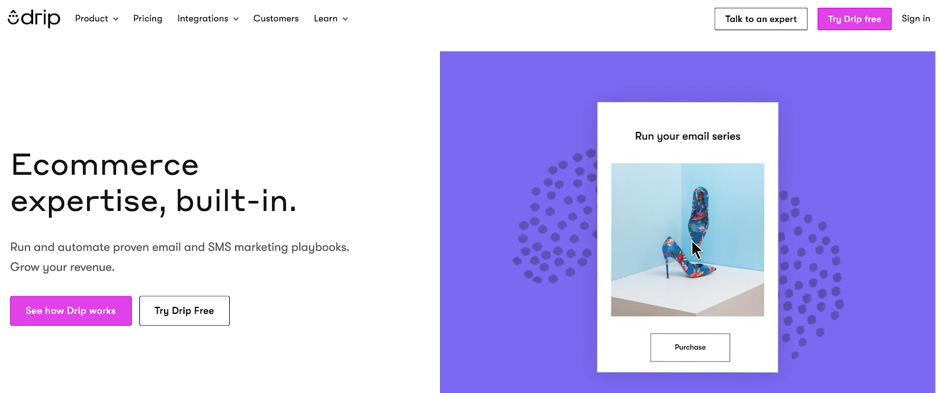
In email marketing jargon, “Drip” means an email sequence that appears in response to some actions taken by potential customers. This is exactly what this relatively young (2013) email automation service emphasizes in its agenda.
In other words, Drip is created as an e-store-centric email marketing platform. The homepage slogan “Grow your revenue with automated emails” reflects how Drip encourages its users.
Another distinctive feature of Drip is its extended social-media integration. No contradiction with Shopify integration is available in it: all ecommerce entrepreneurs are native to social marketing. That’s why Drip’s strategy is logically well-grounded when both channels are combined in one service.
Tracking customers’ behavior in their tiniest aspects triggers an immediate reaction in the form of dedicated emails. This is how Drip sees successful workflows for e-store owners. The available detailed cross-channel analytics can suggest what kind of email campaigns should be created in response to the total amount spent, for example, as well as to any other sort of customer activity.
The available free tier is quite conditional since only 100 contacts are permitted. The paid tiers differ according to the number of subscribers.
The biggest disadvantage of Drip is its pricing: this is probably the most expensive email marketing application on our list.
9. Smile

Personalized communication with the target audience helps build their strong bonds with the brand. Smile is the app that allows you to retain customers through a personalized loyalty program. The service offers 3 easy-to-create options: referral program, loyalty program, and VIP program.
Each one of these programs contains its own tools for building a loyalty reward system that motivates repeated purchases, thus enhancing the sustainable growth of your business. By assigning points, referrals, and VIP statuses, you will make customers more engaged with your brand and consequently increase their loyalty. You will also urge your clientele to work as your brand ambassadors and share your resources with their environment.
The app’s prices range from $49 per month to $599 per month. You are free to select the plan that is most suitable for your business needs. Thus, entrepreneurs seeking to build a professionally branded program may opt for the Starter plan that costs $49 per month. Those who aim to scale their businesses would benefit from the Pro plan. Its price is $599 per month.
10. Campaign Monitor
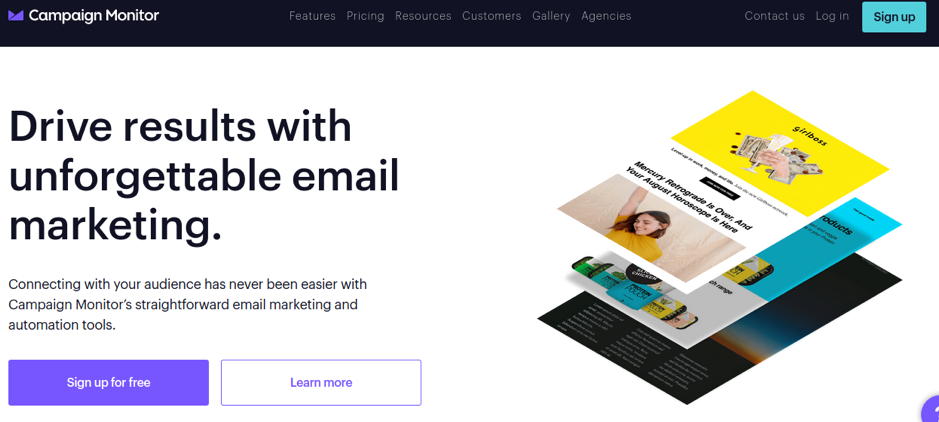
This is another long-liver in email automations that has been developing its user base slowly but steadily. BuzzFeed, Disney, and Coca-Cola among the customers prove that the service is worth its price.
You can barely find something remarkably eye-catching in the options of Campaign Monitor. The set of email marketing features is quite standard: an easy-to-use drag-&-drop email builder, professionally-looking templates, perfect integration with Shopify. But everything offered is non-refusable just like a Kalashnikov gun.
The only more or less rare feature available for advanced email marketing is timezone-based delivery. Campaign Monitor cares about your business reputation: this is about good manners not to bother your customers when they sleep.
The service offers paid plans only unless you count a free one suitable for just testing the service with 5 subscribers. The paid tiers start from $9/month. Quite modest capabilities of the cheapest tier encourage users to change their newbie status for a more professional (and more expensive) one.
The super-limited capabilities of the free plan can be considered the biggest drawback of Campaign Monitor in comparison with other services in our list.
Conclusion
Contemporary email marketing is rich for platforms and services capable of facilitating Shopify-based e-stores. They differ by both the scope of options and pricing. The top 10 email marketing apps given above reflect how progressive e-merchants can engage their audiences with advanced email automation.
We hope our list helps in making your choice wisely.
